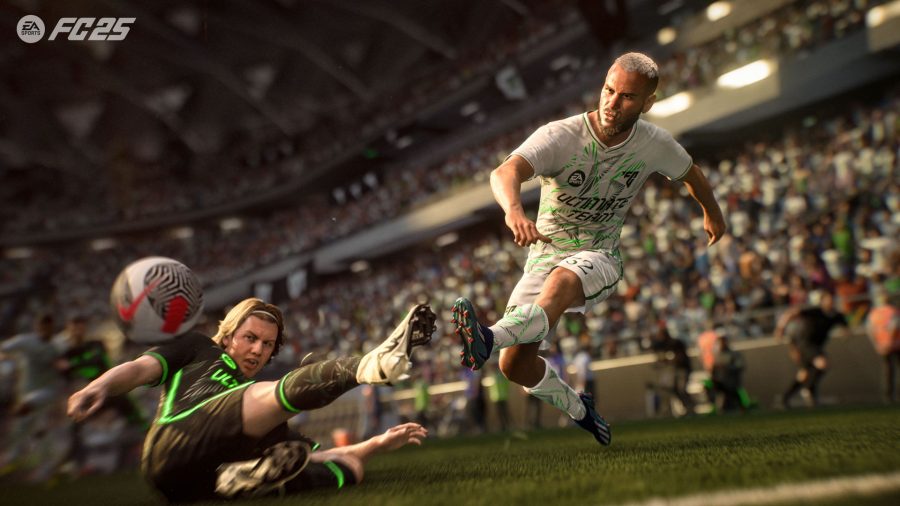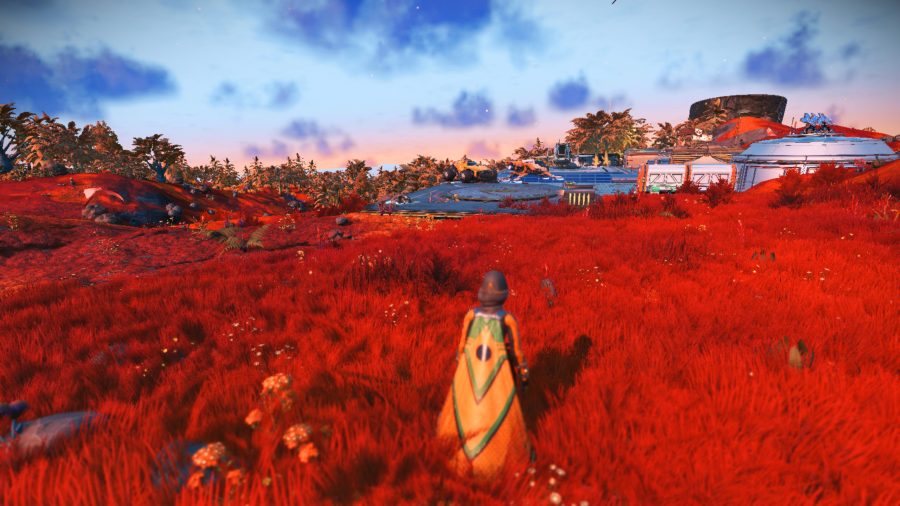The rumors are real, Volta Soccer is gone, hello EA Sports FC 25 Rush. But what exactly is Rush?
I played the new mode at a preview event last week in Vancouver, and while it only has five players (four humans, plus a bot goalie) it’s still a compact version of soccer that emphasizes each player, is designed to deliver big goal moments, and overall gives everyone more time on the ball in a cooperative multiplayer game.
“That was the goal,” producer Sam Rivera told me. “Time on the ball. That was the sweet spot. The smaller the amount of players that you have, you lose some depth; but the more players you have creates a lot of depth, but then it can be too much, and you spend a lot of time waiting.”
Rush begins not with a kickoff granted to the visiting side (or coin flip winner), but with everyone sprinting to the ball at midfield to take possession, somewhat like Rocket League. The pitch isn’t full-size, but it is larger than Volta’s, which was a representation of futsal or street soccer, on a hard surface with a smaller goal. EA Sports developers emphasized that Rush does not have assigned roles (other than the AI keeper); everyone has the ability to defend, attack, and score, and they’re expected to play all of these roles if they want to win.
“We experimented with four players, with five players, with six players,” Rivera said, “we changed the size of the pitch multiple times. We started small, then it was very big, until it was like, OK, ‘This feels fun.’ One of the cool components of 11-vs-11 soccer is when you find space, and taking advantage of that, that feels fun.”
Volta Soccer, not to bag on it gratuitously, was a smaller space with fewer players who were locked into dedicated roles like sweeper and striker. Another reason it never caught on was its separation from the main game. Rush, instead, will be integrated not just with Ultimate Team, but also in EA Sports FC 25’s Clubs mode, as well as Career, where Rush matches serve as a practice run for youth academies when players go scout the up-and-comers and get a feel for their potential.
“There were a lot of learnings from Volta,” Rivera said. “One of them is that it was a separate mode. Players in Ultimate Team, in Clubs, they didn’t want to leave Ultimate Team because then they felt like they were missing out. The answer to that was, ‘OK, we’re going to try something new, but we are going to put it in all of the already existing [modes of] the game so you can experience this social play, in Ultimate Team, or in Clubs, you don’t have to leave.”
I played Rush last week and it was good fun, even though I’m bad at soccer (I did get a couple of good through passes off) and we got walloped 8-2. Whenever there’s a score, there’s a chance to send your teammates an emote — in my case it was often “Sorry!” or “Unlucky!” — but the social nature of Rush is emphasized throughout.
How is Rush different from real soccer?
Rush has some rules modifications, too. One is that offsides is judged in the attacking third of the pitch, as opposed to the attacking half, giving freelancers more room to run. Another is the Blue Card, taking inspiration from an idea that the International Football Association Board mothballed earlier this year. A blue card is shown instead of a red card, and instead of removing the offender from the match permanently, they’re sent off for one minute and allowed to return later, somewhat like the penalty box in professional hockey.
“We know that when you have only four outfielders, if you lose one, the game loses a big part of its balance,” Rivera said. “So we were like, OK, do we really want, after a foul, you get one player sent off permanently. And we experimented, and it was just too punishing. After all, the point is to have fun.”
In one of the matches I played, a teammate made a very hard and even more unjustified slide tackle into an opponent standing still on the ball as they measured up the field. “Sorry,” my teammate giggled, “I had to see the blue card.” Everyone laughed. Though it can be intensely competitive, Rush is meant to deliver these kinds of silly, social moments, too.
But from Rivera’s point of view, the difference is that Rush behaves more like “real” soccer than Volta did, where Volta was an altogether different version of the game that required its own investment, commitment, and knowledge of its style of play. “Instead of trying to create something new, we decided to just take the fundamentals of 11-on-11 and put them in a new environment,” he told me.
The newness that comes from Rush, he said, is more in its surroundings, like the virtual arena developed in partnership with Nike (the pitch is pretty standard, but the exterior is wild, inspired by the shoe’s swoosh logo).
In all, it feels like EA Sports FC developers aren’t necessarily walking away from Volta as an embarrassment or a failure, they’re just learning a lesson from player feedback, and building something that is more suitable to those tastes.
We’ll see when EA Sports FC 25 launches Sept. 27 for Nintendo Switch, PlayStation 4, PlayStation 5, Windows PC, Xbox One, and Xbox Series X.































